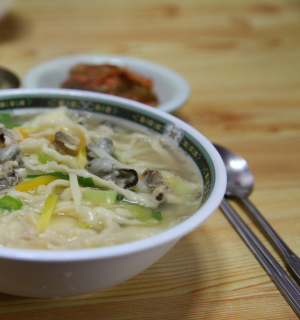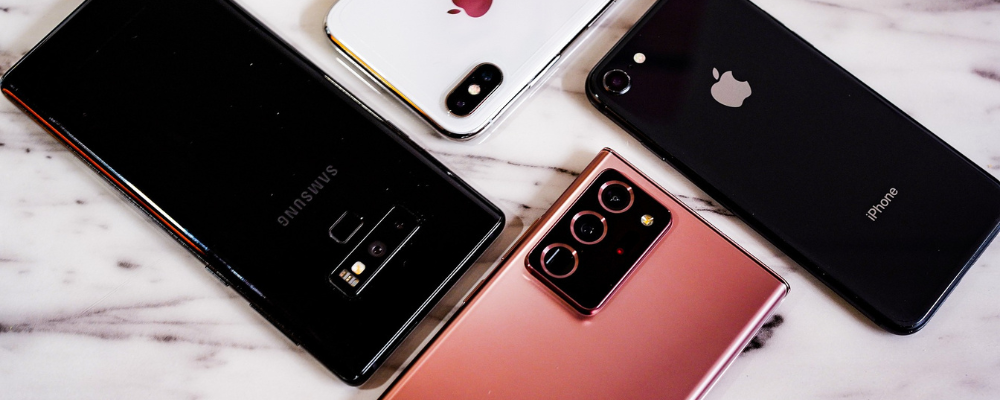
In recent (and not so recent) years there has seemed to be an ongoing war between Samsung and Apple on who makes better smartphones. As a K-pop fan I feel it’s quite logical that I would be more of a Samsung fan than an Apple fan. Not only does Samsung originate from South Korea, but the brand is also heavily promoted by, for example, K-pop idols & Korean actors.
Especially in Korea Samsung is far more popular than Apple. In Q3 of 2023 Samsung accounted for 84% of the Korean smartphone market, compared to Apple’s 15%. Why is this gap so big and such a difference from other areas? For example, the United States where Apple leads with 55% of phone sales in the second quarter of 2023 way ahead of Samsung that comes second with 23%. And in Europe Apple accounted for 33-38% of the sales for each month of 2023, where Samsung remained just a bit lower between 30-32% all year.
For me, my preference for and knowledge about Samsung is mainly based on marketing techniques and things I came across on social media due to my interest in South Korea. So, I dove into Samsung a bit and found out some interesting things that explain a bit why Koreans prefer Samsung over Apple and overall have so much respect for the company. Below you will find the full list of things about Samsung you might not know first, just for the fun of it, as it will bring a lot of confusion. Then you will find out in more detail what’s behind these statements.
- The name Samsung has a special meaning in Korean
- Samsung is a so called ‘Chaebol’
- Noodles and textile were once Samsung’s main products
- The first Iphone was made with the help of Samsung – and they are still manufacturing parts of Iphones for Apple
- Samsungs chairmen are quite controverse
Let’s dive into it!
1. The name Samsung has a deeper Korean meaning
Okay, a small “Korean language class”. Samsung is spelled like this in hangul: 삼성. It consists of 2 syllables: 삼 (“sam”) and 성 (“seong”). The correct pronunciation would thus be “Samseong”. You might have heard that “sam” means “three” and “seong” means “star”, so “three stars” right? Well, you’re not wrong. But also not right.
I tried to find out a bit more and it’s a bit more complex. Three is somewhat of a lucky number in Korean culture. This stems back from various folk tales and Korean history as well as more recent things. I won’t go into detail now. “Three” thus stands for big, numerous and powerful. Then “stars” means bright, high and forever, wishing the company’s success to be everlasting like the stars in the sky.
2. Samsung is a so called ‘Chaebol’
If you are someone like me who is a non-Korean interested in South Korea, you might have heard of the term ‘chaebol’. I have always been a bit confused about what I read about it and some of the specifics, so let me quickly explain some of the basics. In essence a Chaebol is a term used for Korean conglomerate-like industrial organizations that are run by one (Korean) family or individual. A translation of Chaebol (재벌), which literally means “rich family” or “financial clique”, reflects the ‘family’ aspect of this.
In relation to this also people can be referred to as ‘chaebol’ as they are part of the ‘clique’. This is often done when talking about current bosses and chairmen of the Chaebol companies and their children.
The term Chaebol was first used in 1972. However, the development to becoming Chaebol that organizations we now call ‘Chaebol’ went through stem from a bit earlier than that. Ever since the 1920s South Korea’s economy had been quite small and based on agriculture. In 1961 military general Park Chung Hee seized power in South Korea. He initiated rapid industrialisation in South Korea through his Five-Year Economic and Social Development Plan.
This plan consisted of a variety of economic development projects, one of the implications was the government guaranteed loans from banks for Chaebols, that were set to develop new industries, markets and export production to secure a position for South Korea as one of the Four Asian Tigers. This is a term used for the developed East Asian economies of Hong Kong, Singapore, South Korea, and Taiwan (anyone else experiencing flashbacks to their high school geography and history lessons from this?). The governmental policies did not only provide Chaebol with easy financing, but also protected them from international competition.
3. Noodles and textile were once Samsung’s main products
Samsung is the largest of these South Korean Chaebol. The company was founded by Lee Byung-chul in 1938 as a trading company. More specifically, mainly noodles and other local products, like fish, were traded with China. In line with other Chaebol, after the Korean War from 1950 – 1953, after which a split North and South Korea were established, Samsung expanded to textile for which they opened the largest woolen mill in Korea. Since the 1970s Samsung has had complete control over their textile manufacturing from raw materials to end product. It wasn’t until 2022 when they fully dropped from the textile & fashion industry.

The Samsung we know today started developing around the 1950s when it acquired companies and firms in various fields, like banking, insurances, aerospace, ship building, nylon, oil refinery, cement and fertilizer and bought a department store. Additionally the company started investing in heavy, chemical and petrochemical industries.
It wasn’t until 1969 that Samsung started with developing Electronics. They started with a black and white TV. Ever since the 1990s the company has achieved great successes in the global electronic market. With the Samsung Galaxy series in the 2000s as a highlight. At the root of this success are the two research and development institutes that research and develop for Samsung in a variety of technological fields such as telecommunications, aerospace, and nanotechnology.

4. The first Iphone was made with the help of Samsung
One of the most remarkable facts about Samsung is that they had a hand in the creation of the Iphone, their biggest competitor today. As Samsung was one of the largest manufacturers of microprocessors in the late 1900s and early 2000s, the first Iphones ran on microprocessors from Samsung. This covers iPhones and iPod Touch models released between 2007 and 2009 until the Iphone 3GS. In 2022 Apple considered Samsung again as the supplier for their microprocessors as they had a Chinese supplier, but faced difficulties due to import restrictions from China to the US under president Biden. Also the OLED screens from newer Apple models like the Iphone 15 are manufactured by Samsung.
You would say then the ongoing war on ‘who’s best Samsung or Apple?’ can be ended as Samsung is providing major parts of their products, right? Well, not really. The main thing here is that Apple is not a manufacturer, and Samsung is. So this is not really comparing the same parts of their businesses. Additionally, the ideas for the microprocessors and OLED screens manufactured for Apple by Samsung are ‘out of the kitchen of Apple’.
See it like this: Samsung is the chef, but Apple is selecting the ingredients and providing the recipe. Due to the information exchange that is happening in these circumstances there have been quite a bit of plagiarism claims back and forth between Apple and Samsung over the years. But seemingly that has not yet impacted the willingness of working together.
5. Samsung’s chairmen are quite controverse
Back in 2012 Woo Suk-hoon, host of a popular economics podcast in a Washington Post, said that “You can even say the Samsung chairman is more powerful than the President of South Korea.” There have been various instances where Samsung seemingly stood above the law. Not only do controversies happen in the business field where Samsung has been accused of eliminating smaller parties to keep the choices limited (in the South Korean market) or profiting from fixing prices for their products with sellers, but especially in regards to the government.
2nd Chairman: Lee Kun-hee (son of founder Lee Byung-chul)
We’re going back in time a bit again: in 1987 Lee Kun-hee took over Samsung Group from his father, and founder of Samsung Lee Byung-chul.
- The first controversies around him started in 1996, when Lee was convicted for having bribed the president. However, he was pardoned for this by the next president.
- In 2008 Lee was again convicted for bribing; this time it was a variety of influentials, like prosecutors, judges and politicians. After first denying all accusations, Lee later confessed to all claims against him and said he would take full legal and moral responsibility and stepped down as chairman.
- In 2009 tax evasion and breach of trust was added to the list. Lee received 7 years jail time and a fine of 350 billion won (approximately US$312 million) for this. However, he was later pardoned by the then president Lee Myung-bak. In this president’s corruption trial that would take place in 2019, it was revealed that this pardon had also been bribed. Further bribes and political corruption between the two were also uncovered.
- In 2010 Lee was accused of further frauds like stealing billions of US dollars from Samsung sub-companies and bribing officials to secure his son’s position as successor.
Nonetheless in 2010 Lee returned as chairman at Samsung until a heart attack he suffered in 2014 after which he became comatose until his death in 2020. In a 2020 survey among 1000 Koreans after the death of Lee 43.2% stated that the misconduct of Lee was ”not grave” indicating they thought the wrongdoings of the chairman were not that serious. This compared to a not so much higher number of 49.3% who reported thinking the misconduct was either “grave” or “very grave”.
3rd Chairman: Lee Jae-yong (grandson of founder Lee Byung-chul)
Even his introduction on Wikipedia hints (not so subtly) to Lee’s crimes describing him as a “South Korean business magnate and convicted felon”. Although his list of controversies is shorter, it is quite complex with a lot of back and forth. Let’s start at the beginning: in 2014 Lee took over as executive chairman after his father became comatose.
- In 2017 Lee was accused of bribery, embezzlement and perjury, which came to light in the case that led to the impeachment of South Korean President Park Geun-hye (who is one of the people he bribed). He then tried to bribe himself out of his arrest warrant, which failed, and was sentenced to 5 years in prison (a 12-year penalty was sought).
- In 2018 his sentence was reduced further to 2.5 years and his prison sentence was actually suspended after 1 year of imprisonment after an appeal.
- However, in a retrial in 2021 Lee was again sentenced to 2.5 years in prison for the same crime and sent back to prison. The end of that, right? NO, and it gets more complicated!
- Mid-2021 the United States Chamber of Commerce, which is an American lobbying group, joined Korean business groups to urge the release of Lee. Arguing he could help in the midst of the global chip shortage and help in making America independent from overseas computer chips. As his release was, according to the government, in the national interest Lee was released on parole in August 2021. Upon his release Lee bowed and apologized extensively to the present reporters for causing so much concern and promising to do better in the future.
- A month after his release Lee was imposed a fine for drug abuse, namely illegally using the propofol on multiple occasions from a plastic surgery clinic between 2015 and 2020.
- In 2022 Lee was officially pardoned for his bribery, embezzlement and perjury crimes by president Yoon Suk-yeol for his crimes, which led to him being able to become chairman of Samsung Group.

Why Koreans still stand behind Samsung
Overall I feel like this story started on a more positive note for Samsung, but ended in quite the fiasco. So then, after all this, what is the reason Koreans, knowing all this, still prefer and respect Samsung and its products so much?
It’s a love-hate relationship
Some would describe the relationship between Koreans and Samsung as a love-hate relationship. Koreans know of the bad sides of the business and controversies, but the focus really is on the first part of this story. Many Koreans will say that when they see a Samsung advertisement abroad, or a Samsung product being owned by a foreigner, they think of the way Samsung contributed to their country after being torn by wars for decades and making it possible for South Korea to be not only a global player that it is today, but even the 10th largest economy.
The business side of things
Another important part is the business that stands behind the main figures of the company that are being portrayed in the media, like Lee Kun-hee and Lee Jae-Jong. For example, the most famous statement from Lee Kun-hee is: “Change everything except your wife and kids” in reference to the major changes he made after he took over from his father in 1987. He changed the focus of the business to competing with large international businesses’ products in terms of quality, instead of producing a high quantity of low-quality products.
This is arguably the change that made it possible for Samsung to become as big as they are today. The changes Lee suggested didn’t only talk about products, but also about the business itself. Introducing a new management concept, he urged employees to point out errors to their bosses, made many women senior executives and discouraged bureaucratic behavior. This made it one of the more progressive organizations at the time.
My opinion
All in all I think it can be concluded that even though Koreans are aware of the misbehavior of the chairmen of Samsung, it is mostly accepted as ‘a part of business’ and necessary means to an end. It probably also helps that overall the chairmen are quite charming.
For example, current chairman Lee Lee Jae-Jong is known to be a bit cold in his determination, but always polite. He is very open and light-hearted with reporters and will reply personally to emails sent to him. And even after his release from prison at the end of 2021 he started working as vice-chairman for Samsung again, even though he wasn’t able to obtain a salary or be registered as such due to his work ban.
What do you think, did the behaviors of the chairmen, or maybe the Korean history of this change your opinion on Samsung? Or are you a bit like many Koreans and do you think the positive aspects outweigh the negative?
Personally I am a bit inclined towards the last. In some ways it feels like ‘choosing between 2 evils’ or even more evils for me as for every company there is some dirt to be dug up. So for now I will remain a happy Samsung user. Convince me otherwise. 😉

Pingback: A beginners guide to "Chaebol" - Kore-An Recipe